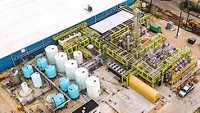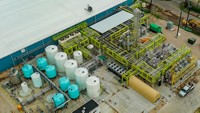Advertisement
Grab your lab coat. Let's get started
Welcome!
Welcome!
Create an account below to get 6 C&EN articles per month, receive newsletters and more - all free.
It seems this is your first time logging in online. Please enter the following information to continue.
As an ACS member you automatically get access to this site. All we need is few more details to create your reading experience.
Not you? Sign in with a different account.
Not you? Sign in with a different account.
ERROR 1
ERROR 1
ERROR 2
ERROR 2
ERROR 2
ERROR 2
ERROR 2
Password and Confirm password must match.
If you have an ACS member number, please enter it here so we can link this account to your membership. (optional)
ERROR 2
ACS values your privacy. By submitting your information, you are gaining access to C&EN and subscribing to our weekly newsletter. We use the information you provide to make your reading experience better, and we will never sell your data to third party members.
Biobased Chemicals
Solugen to expand biobased chemical production with ADM partnership
The company is going after new markets as momentum builds to reduce use of petroleum feedstocks
by Matt Blois
November 3, 2023

As consumer pressure and government policies push chemical firms to reduce the use of petroleum feedstocks, the green chemistry company Solugen is planning to significantly increase production of its biobased chemicals with a new facility.
The new plant will be located next to an ADM complex in Marshall, Minnesota, that produces dextrose, which Solugen will use as a feedstock. Its process co-produces hydrogen peroxide and the organic acids glucaric and gluconic acid.
Solugen CEO Gaurab Chakrabarti says the companies will also work together to develop new products and new markets. “ADM has a lot of customers that we could sell the glucaric acid products into,” he says.
Chakrabarti cofounded Solugen in 2016 to commercialize an enzyme he discovered while in an MD-PhD program. The company has since raised more than $640 million from investors.
At an existing facility in Houston, Solugen produces about 12,000 metric tons (t) per year of hydrogen peroxide, gluconic acid, and glucaric acid from biobased feedstocks. At full capacity, the new facility will be able to produce 75,000 t per year. Chakrabarti says the facility will require at least a $90 million investment. Solugen simultaneously plans to triple the capacity of its Houston facility.
Solugen uses both enzymes and metal catalysts to convert corn sugars into its products. The company says this method is less energy intensive than fermentation alone. In many applications, Solugen’s products are replacing chemicals derived from petroleum.
Solugen’s first product was designed to combat corrosion and scaling in water treatment systems. Over the past year, the company has introduced products to treat wastewater from the oil industry, increase nutrient uptake from fertilizers, slow the curing of cement, and improve household cleaning products—all made from different formulations of its three chemicals. “Our customers found a bunch more uses,” Chakrabarti says. “It dramatically increases our market size.”
In October, Solugen announced a partnership with Sasol to explore commercialization of chelating agents for cleaning products. Chakrabarti says the company continues to research ways to produce new molecules with its technology.
Solugen’s expansion comes at a time when biobased chemicals are gaining momentum. In a recent report, analysts from the consulting firm Deloitte forecast that efforts to decrease the use of fossil fuels will build demand for biobased chemicals in the coming year and beyond.
But Robert Kumpf, a Deloitte executive who advises clients in the chemical industry, points out that biobased products make up just a small fraction of total chemical production today and that it will take a long time for that fraction to become significant. He says the cost of producing biobased materials will have to come down, and they will also have to perform better than alternatives.
“Look for the ‘and’ statement … I’m bio and I’ve got XYZ to offer,” he says. “We consider that to be a key success criteria.”




Join the conversation
Contact the reporter
Submit a Letter to the Editor for publication
Engage with us on Twitter